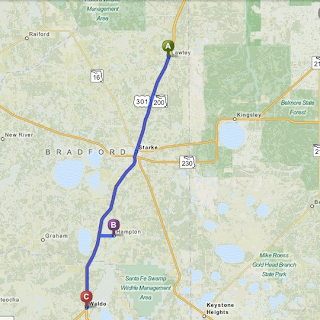Picture a village whose reason for being is a criminal enterprise. Imagine its entire raison d’être, its very existence hinges upon fleecing the public. Typical of such towns, as many as one in fifteen to twenty of residents– men, women, children and chickens– are part of its politico-judicial machinery: crooked cops, municipal machinators, and corrupt clerks.
And not ordinary crooked cops, but heavily armed with the latest in high-power assault weaponry and shiny pursuit vehicles. Police– poorly trained but still police– yet some may not have been certified officers at all. One fancied himself Rambo and stopped tourists with an AR-15 slung across his chest like that inbred couple in Open Carry Texas.
Village authorities arbitrarily moved town limit signs beyond the actual town’s boundaries in a bid to increase exposure to radar patrol… and revenues. When cops sat in lawn chairs aiming their radar guns and sipping from their open containers, they turned a blind eye to the citizens who dried their marijuana in the convenience store’s microwave. Oh, and those shiny police cars? The town often didn’t bother to insure them, this in a village where the police department wrote more tickets than Fort Lauderdale but still outspent its budget.
 |
| First of three speed traps in a 20 mile stretch of US 301. AAA believed to sponsor sign. |
Set this supposition aside for the moment.
When I was a kid who couldn't yet drive, a short story left an impression on me. The plot centered around a man traveling to Florida who was caught in a small town speed trap. The police tossed him in jail.
Andy Griffith they weren't: they kept him imprisoned as the authorities systematically drained his assets like a spider sucks juices from a fly. Who do you turn to when the law is corrupt?
Florida sunshine has always attracted northerners during the icy winter months. In the first half of the 20th century, snowbirds filtered south through the highways and byways of America. Before the 1950s, towns and villages in the arteries of early tourism discovered they could make money fleecing tourists passing through their area.
 | |
| Lawtey, Hampton, Waldo speed traps | |
 | |
| US 301: Jacksonville ↔ Gainesville Atlantic at right, Georgia border at top |
Some places in the Deep South considered northern travelers carpetbaggers and therefore fair game. Even so, town fathers and others found it easy to offset moral compunctions when considering the sheer profit involved. Could they help it if a Yankee ran a stop sign obscured by tree branches or failed to notice the speed limit abruptly changed from 55 to 25?
Where’s Waldo?
In the tiny towns of Lawtey, Hampton, and Waldo, that’s exactly what happens as the speed limits bounce every block or so from 55 to 30 to 45 to 25 and back again. If you have the time and patience, you might try locking your cruise control in at 25mph, hoping to beat the system. But they have an answer for that too– tickets for failing to maintain a safe speed.
In the early 1990s, it dawned on Hampton that nearby US 301 was an untapped piggy bank with the emphasis on piggy. The highway had been a source of resentment when it passed within a few hundred metres of the town limits, but devious minds found a way to make the road pay. The village annexed a strip of land 420 yards (384 metres) along the federal highway and began hiring candidates for police officers. Hampton’s speed trap was born.
(See maps below.)
In a state with a governor who committed the largest Medicare/Medicaid fraud in history, it takes a lot to outrage the Florida Legislature, but over time, Hampton succeeded. Their downfall started when they had the audacity to ticket State Representative Charles van Zant. Thanks to him, Florida lawmakers drew up plans to revoke the city's charter and revert the village to an unincorporated plat of county land.
 |
| Hampton with annex |
 |
| Hampton |
While the town failed to properly bill residents for the water utility, the clerk collected cash– Sorry, no receipts. The water department can’t reconcile nearly half of the water actually distributed, telling auditors the records were “lost in a swamp.” And if residents complained about inefficiency and corruption, their water supply was cut off altogether, prompting Bradford County Sheriff Gordon Smith to refer to the situation as “Gestapo in Hampton.”
As CNN suggested, the town became too corrupt even for Florida to stomach. State and federal auditors agreed and wheels started turning to unincorporate the town and strip it of its charter. The road to perdition seemed inevitable.
Road to Recovery
But not everyone saw it that way. Once corrupt authorities slunk back into the shadows, good citizens of Hampton stepped forward. A former clerk took over the reins. A new resident made plans to run for mayor, replacing the current mayor who resigned from his jail cell. Volunteers put together a plan to bring the town into compliance and moreover, they acted upon it. Among other things, the town plans to de-annex the strip of land encompassing US 301 although the ‘handle’ part of the town’s griddle shape will remain.
At present, efforts to revoke the town’s charter remain in abeyance and it looks like the town may have saved itself. We can only wish legislators had the political gumption to rid the state of speed traps altogether in places like Waldo, Lawtey, and Windemere.
Short Story Bonus
And, in case you were wondering, Jacksonville is probably not named after Shirley Jackson, despite her [in]famous short story about a small town. Read it on-line | download eBook PDF | download audiobook.